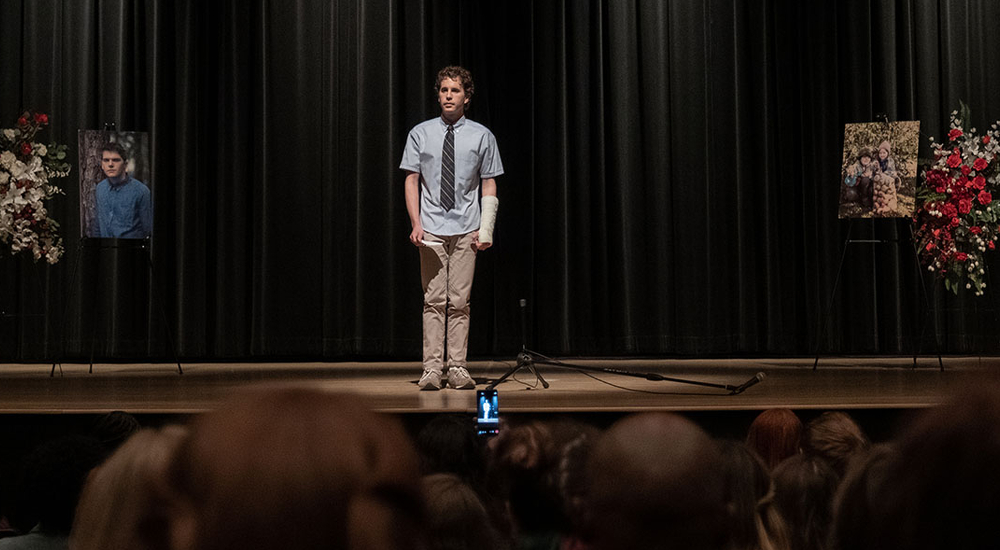"That is the saddest thing I ever heard."
For years creators have struggled to transition hit Broadway musicals to the big screen. Tom Hooper's adaption of Andrew Lloyd Webber's Cats aside, the task is heavy as the two mediums couldn't be further disconnected. For every Chicago and Rent, we have a Nine and The Producers. So when Dear Evan Hansen was first announced, I was nervous - anxious even. Expectedly, my feelings were equally well warranted and overblown as Stephen Chbosky's adaption fails to capitalize on the energy and tone of its source material but does just enough to expand the story's global impact.
Though many will (and have) questioned the decision to have Ben Platt reprise his Tony-winning performance as the titular character, there was honestly no other option. Sure the 27-year-old actor struggles to pass as a high school senior, but the role of frail, timid Evan is his, the film a fitting conclusion to an arc that made Platt a household name.
His vocals, an unforgettable part of the original production, are gut-wrenching as Evan navigates the world of modern-day high school, longing for a place to belong. When we first meet him, he is writing a letter to himself, an assignment from his therapist. With medication on his bedside table, he struggles to find why today will be a good day.
That letter will forever change Evan's life as it leads to a series of miscommunications and assumptions when the parents of a young student who kills himself are led to believe that Evan was his best and only friend. Evan goes along with lies, riding a wave to popularity amid the family's grief. But, as it always does, the truth rises to the surface, sending Evan to a well-earned crash landing.
The plot, controversial for many, plays well. Over the last few years, the stage production has garnered a rabid teen fan base, thanks primarily to a slew of catchy, pop-centric tracks and the relatability of Platt's performance. On stage, the fusion of story and song works beautifully. However, on the big screen, it takes quite a bit to get used to.
Unlike other Broadway adaptions, Chbosky maintains a sense of authenticity within the scope of the narrative, allowing the story to ebb and flow to the tracks. Rather than shine a spotlight or differentiate internal melodies from external realities, everything moves in one motion. At times it works, but more often than not, notably in the second half, it struggles.
The film likely wouldn't survive such an approach without the work of Platt, who tones down his performance without losing the characteristics that have drawn fans to Evan. He clicks organically with his costars, notably Julianne Moore as his hard-working mom and Amy Adams as the wealthy mother of Connor Murphy, the boy who took his own life. They each represent a different take on a desperate parent, longing for some level of connection with their child. Their subtle work doesn't go unnoticed, even if I am still a bit frustrated that Rachel Bay Jones isn't involved.
Amandla Stenberg earns strong praise for her take on Alana Beck, an overachieving student who plans a memorial for her former classmate. Unlike the stage production, a song has been added, highlighting Stenberg's talent and giving Beck a stronger voice within the story's context. Though too many musical numbers made their way into the film, the addition here, as well as a finale from Colton Ryan, are highlighting additions.
Though an over two-hour runtime at a Broadway theater is expected, sifting through the same timeframe in a cinema is an entirely different pill to swallow. I admire Chbosky's intent to further dig into Evan's misdeeds, forcing him to confront and answer for his actions. But Dear Evan Hansen will not be enjoyed or celebrated by all. Plot frustrations aside, the film celebrates its musical roots while being just different enough to frustrate loyalists. To stay true to itself, it has, in many ways, lost its own identity, forcing others to take it for what it is: a musical drama with a muffled, heartfelt message wrapped neatly inside.

